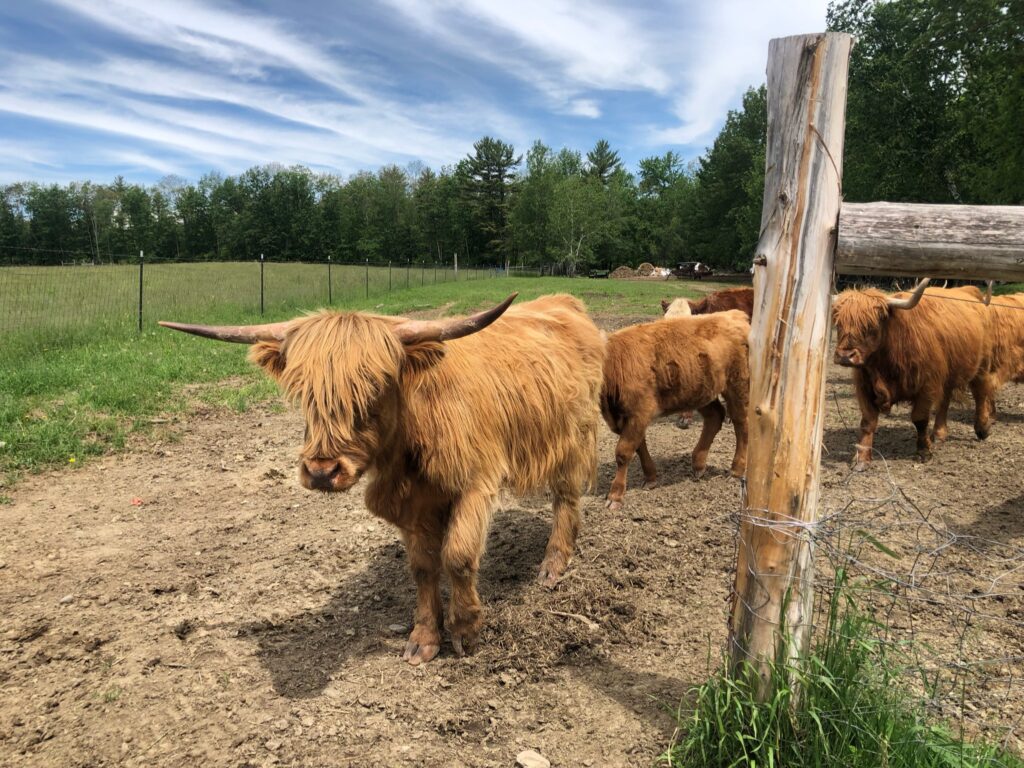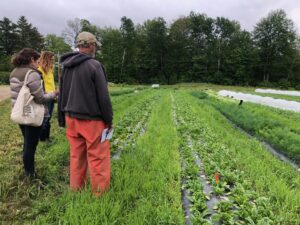Hello! My name is Alex Gulachenski, and I am Wolfe’s Neck Center’s Farm Networks Coordinator. I am a recent addition to the Wolfe’s Neck Center staff, and I am excited to tell you all about the important work we are doing with Farmer Networks! As an ecologist by training, I view agriculture from a systems and community-centered perspective, and I love building connections between food production principles, farmer wellbeing and livelihood, and food system resilience. I hope you enjoy this short update about our work to address climate change through community, farming, and knowledge sharing!
Wolfe’s Neck Center is committed to developing solutions to climate change through agriculture. A key component of that mission is both ground-truthing climate smart agricultural solutions through our own farm operations as well as supporting other farmers’ adoption of climate smart practices. Wolfe’s Neck Center is fostering collaborations amongst organizations, farmers, and institutions that aim to facilitate information sharing, innovation, and improved practices.
This work is not only embodied in Wolfe’s Neck Center’s role as an education and research farm, but also in its role as a convener and facilitator of farmer networks. As Farm Networks Coordinator, I am the person on the ground working with farmers to achieve these shared goals.
Maine Soil Health Network
Wolfe’s Neck Center and Maine Farmland Trust (MFT) collaborated to launch the Maine Soil Health Network (MSHN) in 2021 to provide Maine farmers with information and support to improve soil health on their farms. Healthy soil is not only important to farmers for production and healthy animals, but also as a tool to combat climate change. Soil can mitigate harmful greenhouse gas emissions by absorbing carbon from living and dead organic matter. The carbon is stored safely in the soil until it is disrupted by practices like tilling, which releases carbon back into the atmosphere. Soil health is a key component in building climate resiliency in the agricultural system.
In support of Maine Soil Health Network’s mission, I have been joining MFT staff on site visits to all participating farms. In my travels, I have learned about farmers’ management strategies, soil health challenges and their long-term goals for climate adaptation. This year the overwhelming theme of these visits has been discussing the challenges and benefits of switching to minimal or no-till farming. Making the switch improves soil structure, reduces dependency on expensive machinery and equipment, reduces water pollution in runoff, decreases soil erosion, and creates more biodiverse and pest resistant soils. Through these farm visits, the Maine Soil Health Network has been able to connect farmers to share their challenges and successes and learn more through experts and focused educational events.

At the end of this summer, we will return to participating farms to aid farmers in soil health sampling. This sampling paired with detailed record-keeping allows farmers to participate in the much larger Soil Health Benchmarking Study by PASA Sustainable Agriculture. The Soil Health Benchmarking Study helps farmers gauge their soil health compared to other farms with similar crops or livestock. Started in 2016, it now includes over 150 farms across Pennsylvania, Maryland, and now Maine. Through networks like this one, farmers are also able to share their stories, access support and funding from local service providers for long-term planning, and access technical service and research in quarterly meetings, workshops, and an annual retreat.
We are looking forward to a busy summer working to support on-going research here at Wolfe’s Neck Center as well as through active participation in our growing networks –OpenTEAM, MSHN, and the New England Grazing network. These networks serve as an opportunity to build deeper connections, share knowledge, monitor data, and generate support across the region with the goal to create a healthier regional food system and safeguard the future of food and agriculture in Maine!
